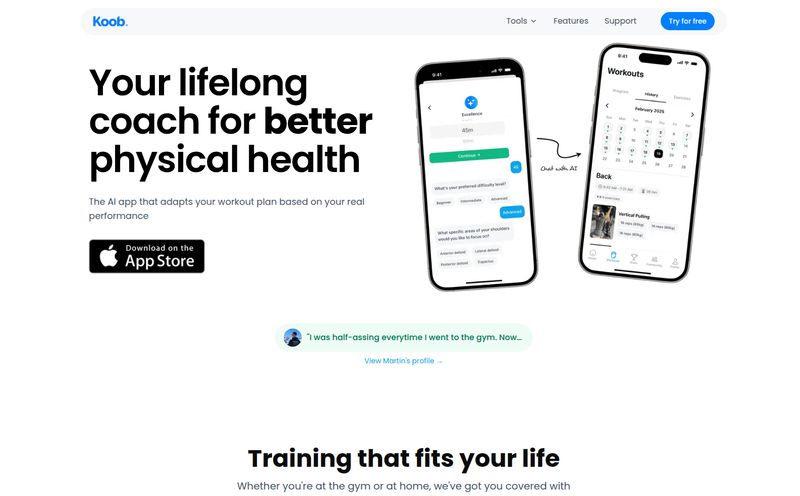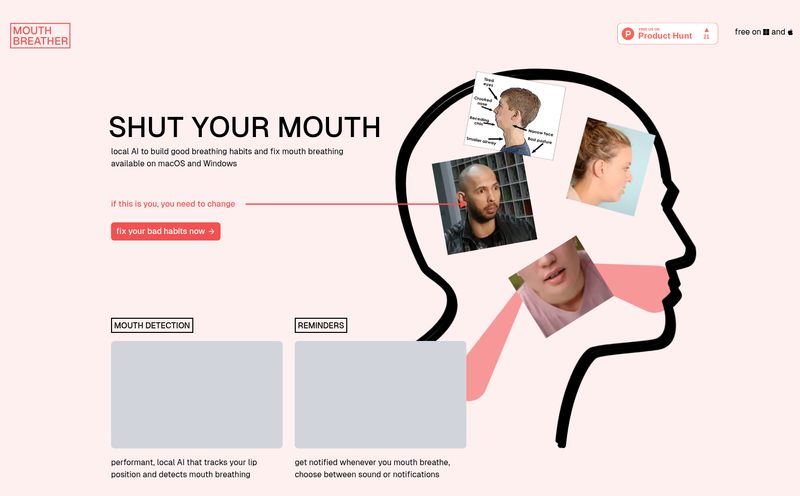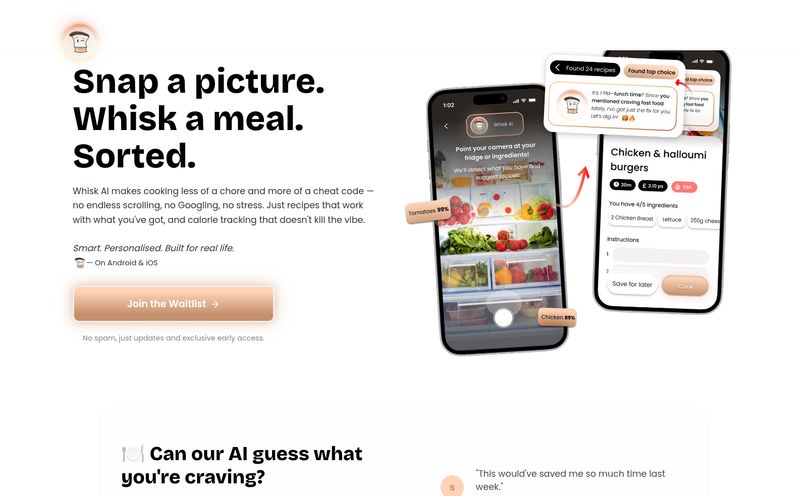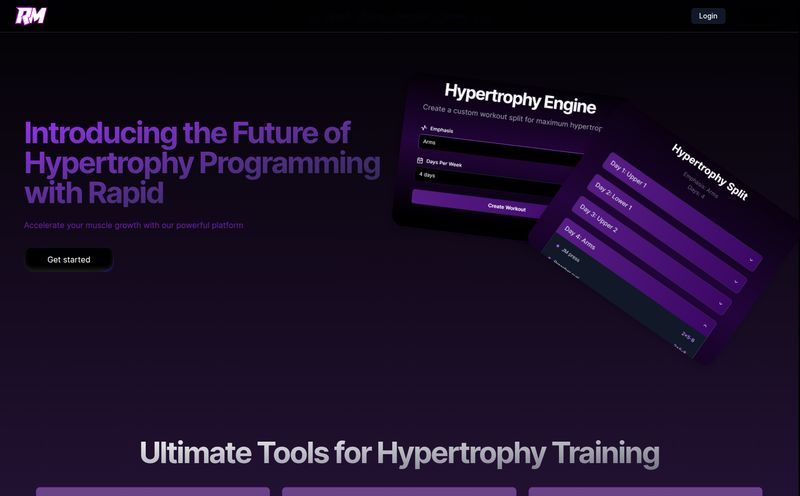As someone who's been in the SEO and digital trends space for years, I see a lot of new tools. Every day, there's a new AI-powered-something that promises to revolutionize how we work, live, or, in this case, how we get fit. Most of them are just noise. But every so often, you stumble across an idea so simple, so elegant, that you can't help but get excited. That was me when I first heard about Calorease.in.
The concept? A fitness companion that lives inside your WhatsApp. No clunky app to download. No complicated interface to learn. Just you, chatting with a bot to log your meals, get workout plans, and track your progress. It sounded... perfect. Almost too perfect.
For anyone who's ever tried to stick to a fitness plan, you know the biggest enemy isn't the workout itself or the diet. It's the friction. It's the sheer annoyance of opening an app, searching for 'scrambled eggs, two, large', figuring out the exact amount of olive oil you used, and logging it all before you've even had your morning coffee. It’s a chore. And chores are the first thing to go when life gets busy. So, an AI that lets you just text "I had 2 eggs and a piece of toast for breakfast"? Sign me up.
What Was the Big Idea Behind Calorease.in?
From what I could gather, Calorease.in was designed to be the ultimate low-friction fitness partner. The entire system was built around a few core pillars that, on paper, solve some of the biggest pain points in digital health tracking.
AI-Powered Calorie Tracking via Chat
This was the main hook. The platform's AI was supposed to be smart enough to understand natural language. You could simply send a message to the WhatsApp bot describing your meal, and it would parse the information, calculate the calories and macros, and log it for you. This is a far cry from manually searching through endless food databases. It’s the difference between having a conversation and filling out a spreadsheet. One of those is distinctly more human.
Truly Personalized Fitness Plans
Beyond tracking, Calorease aimed to provide personalized exercise routines. Based on your goals, logged data, and maybe even your feedback, the AI would generate workouts for you. This is a common feature in fitness apps, but the integration with the rest of the conversational platform is what made it intriguing. You could potentially ask it, "what's a good 20-minute workout I can do at home with no equipment?" and get an instant, tailored response.

Visit Calorease.in
Why Logging Calories on WhatsApp is a Game-Changer
Let's be honest for a second. I've used MyFitnessPal for years. It's powerful, it has a massive database, and it works. But I've also uninstalled it at least five times. Why? Because it feels like work. The idea of moving this entire process to an app I already have open all day long is just brilliant.
Think about it. WhatsApp is where you talk to your friends, your family, your colleagues. It's a native, conversational environment. Sticking a calorie-tracking bot in there makes it feel less like a rigid, judgmental health app and more like just another contact you check in with. It lowers the barrier to entry so, so much. Its a subtle psychological shift, but one that could be the difference between sticking with a plan for three days versus three months.
This approach transforms calorie counting from an isolated, data-entry task into a continuous, simple conversation. It’s like having a nutritionist in your pocket, not on a separate, dusty app shelf in your phone.
The Double-Edged Sword of AI Personalization
Of course, this all sounds great in a pitch deck. The reality of AI, especially in health, is always a bit more complicated. The effectiveness of a tool like Calorease lives and dies by the quality of its AI. If it consistently misunderstands your meal descriptions or gives you generic, uninspired workouts, the whole convenience factor evaporates.
And then there's the trust issue. Health data is incredibly personal. One of the cons I noted in my initial research was a lack of clear information on their data privacy practices. When you're handing over your daily food diary and exercise habits to an AI, you want to know exactly how that data is being stored, used, and protected. For many, the convenience might not be worth the privacy trade-off if the company isn't transparent. Some might argue that established players like Noom, with their human coaches, provide a better balance, but that comes at a much higher price point.
So, Where Did Calorease Go?
So here's the twist in the story. After getting all excited about this concept, I did what any digital native would do: I tried to go to the website. I typed `calorease.in` into my browser, hit enter, and was met with... well, this:
Site Not Found. There is no site configured at this address.
Oof. That’s the digital equivalent of a “We’ve Moved!” sign with no forwarding address. It's a ghost town.
What does this mean? It's hard to say for sure, but in the fast-moving world of tech startups, it's often not a good sign. It could mean the project ran out of funding, the founders moved on to something else, or it was simply an idea that never fully got off the ground. It’s a shame, really. The idea had so much promise, and it speaks to a genuine need in the market. Maybe it was just a bit ahead of its time, or maybe the technical challenges were too great. We may never know.
If Not Calorease, Then Who?
The disappearance of Calorease doesn't mean the idea is dead. The concept of conversational, AI-driven health support is very much alive. If you were intrigued by the idea, there are other avenues to explore, even if they dont offer the exact same package.
While not dedicated fitness coaches, general AI assistants on WhatsApp like Luzia can answer health questions, suggest recipes, and even create basic workout plans if you prompt them correctly. They lack the dedicated tracking features but can scratch a similar conversational itch.
For more robust tracking, you're still looking at the big players like MyFitnessPal or Cronometer. They might not have the WhatsApp integration, but they are reliable, feature-rich platforms. You just have to accept the friction that comes with them. The dream that Calorease was selling—a truly seamless, integrated experience—doesn't seem to have a perfect replacement just yet. But the industry is moving in that direction.
The Future is Frictionless
Even if Calorease.in is now just a digital memory, it served as a perfect proof of concept. It highlighted a massive opportunity: making health and fitness tracking as easy as sending a text message. The future of consumer health tech isn't about more features, more charts, or more complex apps. It's about less. Less friction, fewer steps, and less thinking.
We're seeing this trend everywhere. We want to talk to our devices, not just tap on them. The companies that figure out how to embed powerful tools into our existing daily workflows—like a simple WhatsApp chat—are the ones that are going to win. Calorease may have stumbled, but it was definitely running in the right direction.
Frequently Asked Questions about AI Fitness
What was Calorease.in?
Calorease.in was a planned AI-powered fitness companion that aimed to let users track calories, get personalized exercise plans, and discover recipes primarily through a WhatsApp bot, focusing on convenience and ease of use.
How was Calorease supposed to track calories?
The core feature was its AI-driven WhatsApp bot. Users could send a text message describing their meal in natural language, and the AI would analyze the text to estimate and log the nutritional information automatically.
Is Calorease.in still available?
Based on our investigation, it appears not. The website `calorease.in` is currently inactive and displays a "Site Not Found" error, suggesting the service is no longer operational.
Why is using WhatsApp for fitness a good idea?
It dramatically reduces friction. By using an app that most people already have open throughout the day, it removes the need to open a separate, dedicated application, making the habit of tracking meals and workouts easier to maintain.
What are the risks of using an AI fitness coach?
The primary risks involve accuracy and privacy. The AI's dietary and exercise recommendations may not always be perfectly accurate or suitable for everyone. Additionally, sharing sensitive health data requires a high level of trust in the company's privacy and security practices.
What should I look for in a modern fitness tool?
Look for a tool that fits your lifestyle. Prioritize ease of use and low friction. Always check their privacy policy to understand how your data is handled. And remember that no app is a substitute for professional medical advice, so look for tools that support your health journey, not dictate it.
Conclusion
So, Calorease.in remains a bit of a fascinating mystery—a great idea that seems to have vanished into the digital ether. While we can't sign up for their service today, we can appreciate the problem they were trying to solve. The quest for a frictionless, intuitive, and genuinely helpful fitness companion continues. And I, for one, am excited to see who finally cracks the code. The ghost of Calorease shows us the path; now we just need someone to build the road.
Reference and Sources
- Noom: https://www.noom.com/
- Luzia (WhatsApp AI): https://www.luzia.com/en
- MyFitnessPal: https://www.myfitnesspal.com/



